July 30, 2025: Summer Research Institute Poster Session
Orla Meehan and Rachael Romano presented a poster about their summer research titled “Understanding Contextual Variation in Interpersonal Physiological Synchrony” at the 2025 Lida Orzeck ‘68 Summer Research Institute Poster Session.
They will continue their work on physiological synchrony with Professor Thorson throughout the 2025-26 academic year.
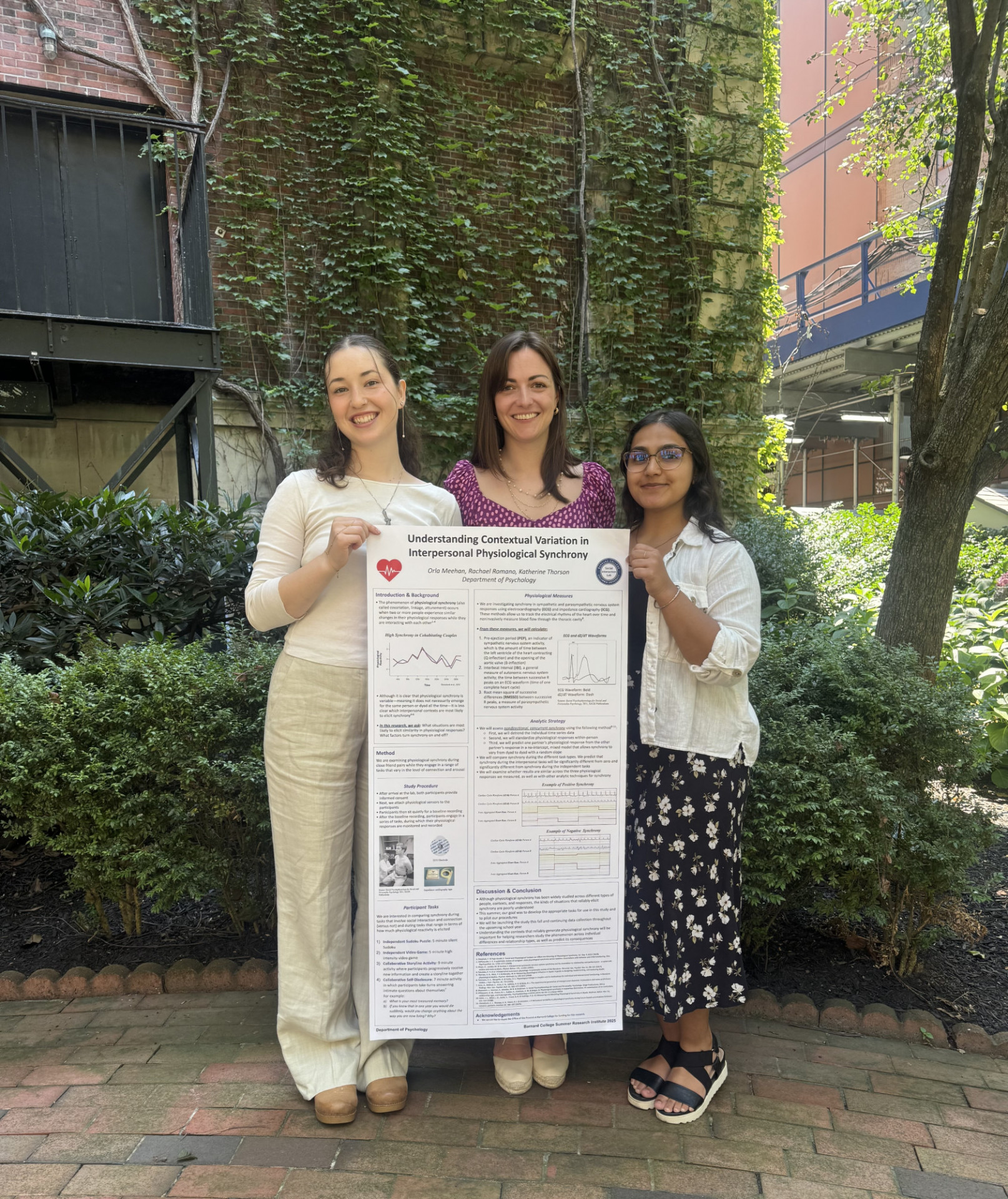
May 20, 2025: Graduation
Congratulations to lab members Rebecca Klein and Tatiana Santos Mroczek on their graduation from Barnard! Rebecca will be starting graduate school for a PsyD in the fall, and Tatiana will be working as an executive assistant at "The Tonight Show Starring Jimmy Fallon."
April 30, 2025: Honors Assembly Awards
Congratulations to our lab member, Rebecca Klein, for receiving The Millennial Psychology Prize, which is awarded to a student who plans to continue her scientific or professional training in psychology or a related discipline. Rebecca will be attending Ferkauf Graduate School of Psychology at Yeshiva University to earn a PsyD in the fall. Rebecca was also inducted into Phi Beta Kappa this spring. Congratulations, Rebecca!
January 2, 2025: New chapters in the Handbook of Research Methods in Social and Personality
Professor Thorson co-authored two chapters in the recently-published third edition of the Handbook of Research Methods in Social and Personality Psychology. One chapter focuses on behavioral observation and coding (with Tessa West), and the other describes techniques for longitudinal data analysis (with Amie Gordon).
Sept 1, 2024: Lab Alumni News
Best wishes to three of our lab alums who are starting graduate school this fall! Emily Mintz will be attending Hofstra University for a PhD in Clinical Psychology, Talia Rosen will be attending Yeshiva University for a PsyD, and Bri Vigorito will be attending Hunter College for an MS in Mental Health Counseling. We are so proud of you all!
July 31, 2024: Summer Research Institute Poster Session
Rebecca Klein, Orla Meehan, and Tatiana Santos Mroczek, presented a poster about their summer research titled “Self-Disclosure and Responsiveness: An In-Depth Look at the Behavioral Coding Process” at the 2024 Lida Orzeck ‘68 Summer Research Institute Poster Session.
We are so impressed by all the work they put into their research and are excited to see them continue to analyze this data!
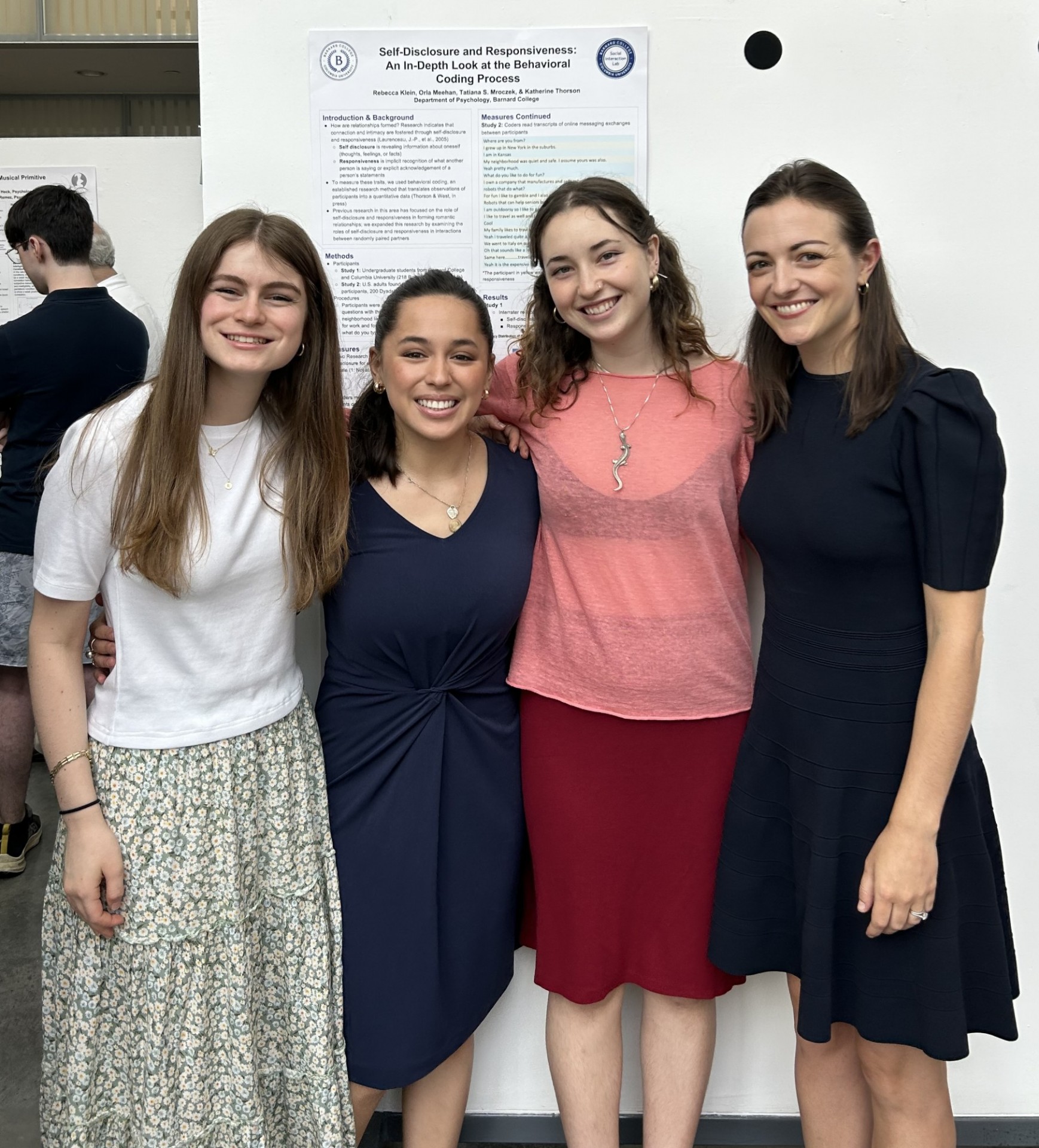
July 26, 2024: New paper in Emotion
In a new paper, we investigate behaviors associated with physiological covariation in romantic couples during a discussion about their futures. We found significant variability in how much couples experienced covariation, and covariation depended, at least in part, on people’s behaviors during the discussions. These findings underscore couples’ physiological synchrony as a heterogeneous process that can emerge with the presence of greater behavioral and emotional positivity. Please check out the paper to find out more! And congratulations to PhD student affiliate, Claire Shimshock, for her first-authorship on this paper!
May 2, 2024: Psychology Research Festival
Phoebe Muntz and Tatiana Mroczek presented their research in the lab at the Spring Psychology Research Festival. Both projects examined how people form relationships across social status differences. Congratulations to both of them on their excellent presentations and work!
April 18, 2024: Honors Assembly Awards
Congratulations to graduating lab member Phoebe Muntz for receiving The Faculty Recognition Prize for Distinguished Achievement in Psychology!
March 1, 2024: New Paper in Social Psychological and Personality Science
In a new paper, we investigate whether an intervention focused on guided conversations is associated with increases in intellectual humility and whether these changes are stronger when people perceive greater affiliation with their conversation partner. Participants completed an intervention with four guided conversations and reported on their relationship with their partner after each conversation.
February 9 & 10, 2024: Society for Personality and Social Psychology Annual Conference
Maisha Alam and Tatiana Mroczek presented their poster entitled “Behavioral Self-Disclosure and Responsiveness Predict Affiliation in Newly-Acquainted Dyads Regardless of Social Status Differences” at the annual Society for Personality and Social Psychology (SPSP) conference in San Diego, California. In new relationships, self-disclosure and responsiveness are positive predictors of affiliation. So they examined whether this was true even when dyad members differed in social status from one another. Their findings highlight that self-disclosure and responsiveness are consistently important for relationship formation, regardless of differences or similarities in social status. Their poster was remarkable, incorporating analysis of the data sets gathered during the summer of 2023. At the SPSP conference, Maisha and Tatiana also had the opportunity to attend various talks, workshops, and poster presentations to further enrich their knowledge and understanding of social and personality psychology. They are looking forward to further analyzing data and expanding on their study.
Excellent work, Maisha and Tatiana!
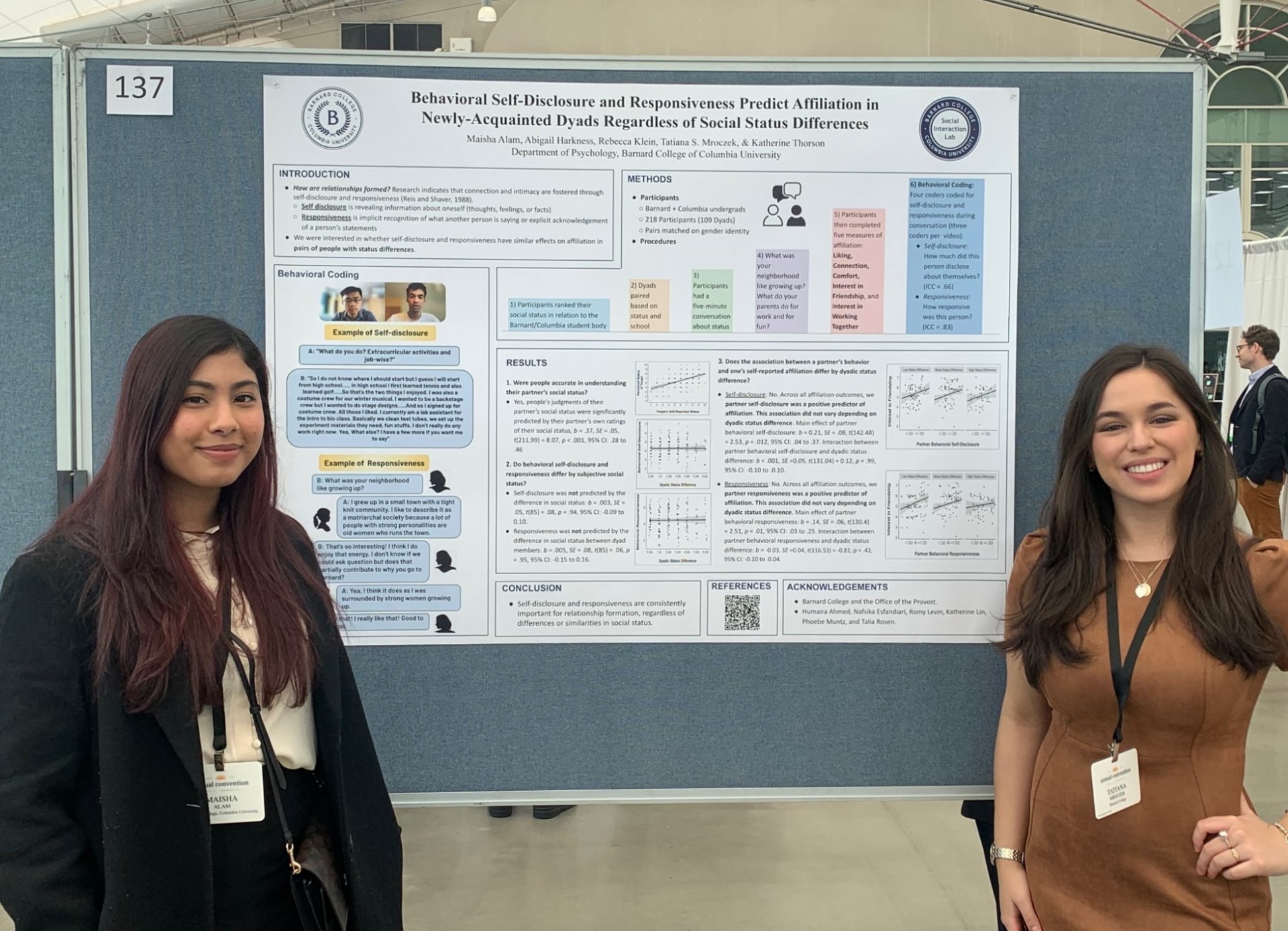
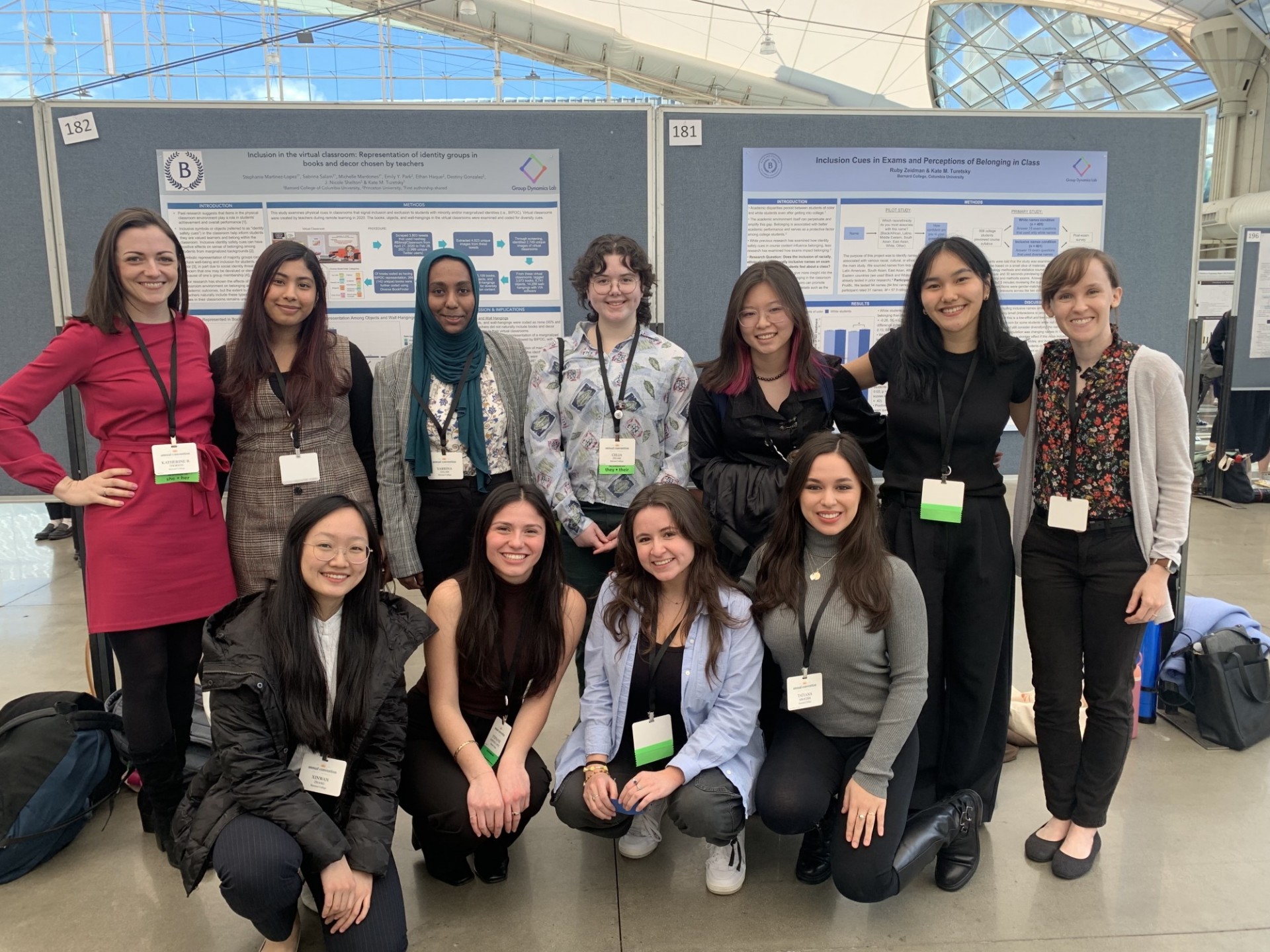
September 2023: New Paper in Health Communication
- Post by Maisha Alam
Have you ever wondered about the experiences that doctors and patients have during appointments? And what about appointments that are specifically focused on the delivery of news—for example, about a recent test result? Our new research study, “An Investigation of Patients' and Doctors' Autonomic Nervous System Responses Throughout News-Focused Medical Consultations” focuses on this topic. Medical consultations can be overwhelming and distressing for both parties; however, limited research delves into both doctors’ and patients’ experiences during and throughout consultations.
The focus of our study is to better understand the experiences of both the patient and the doctor during real-life medical consultations. We aimed to discover the potential changes and differences between their experiences and further explore how the types of news delivery may influence the responses. We examined patients’ and their oncologists’ autonomic nervous system (ANS) responses via cardiac interbeat intervals (IBI) to detect rapid physiological changes. Throughout the study, we focused on two distinct phases of news-focused medical consultations: the news phase and the information phase. We also investigated three types of news delivered to the patients: good, bad news, or status quo.
Our study revealed that patients’ arousal quickly decreased during the news phase. This is likely because patients experience anticipatory stress going into these interactions; this anxiety appears to wane rapidly in the first few minutes of these encounters—the moments when patients first receive the news they have been awaiting. After receiving this news, patients’ responses then remained steady during the information phase. Meanwhile, doctors maintained a consistent response throughout both phases. Moreover, we noticed differences in arousal trajectories during the information phase, depending on the news type. Autonomic arousal increased over time for “status quo” consultation—potentially because of the uncertainty in these situations—but remained constant for “good” and “bad” news.
Overall, this study not only highlights the distinct experiences of patients and doctors during news-focused medical consultations but also emphasizes the significant shifts that can occur in patients’ experiences across the various phases of the consultations. These findings can offer more nuanced approaches to healthcare communication between doctors and patients, ultimately enhancing the support and well-being of patients.
Lastly, this paper represents the final paper of PhD student affiliate Marta Vigier’s dissertation! Congratulations to Marta for finishing her doctoral work!
August 2, 2023: Summer Research Institute Poster Session
Our research assistants, Maisha Alam, Rebecca Klein, and Tatiana Santos Mroczek, presented their poster entitled “Behavioral Self-Disclosure and Responsiveness Predict Affiliation in Newly-Acquainted Dyads Regardless of Social Status Differences” at the 2023 Lida Orzeck ‘68 Summer Research Institute Poster Session.
Some of our research assistants collaborating with the Columbia Couples Lab presented as well. Humaira Ahmed presented “Relationship Between Co-rumination, Responsiveness, and Relationship Quality Among Romantic Couples.” Akeila March presented “Self-Efficacy & Physiological Reactivity.” Taylor Whang presented “The Impact of Social Support on Physiological Reactivity and Recovery of Couples during an Acute Lab Stress Task.”
We are so proud of all of their hard work and look forward to seeing all that they do going forward!
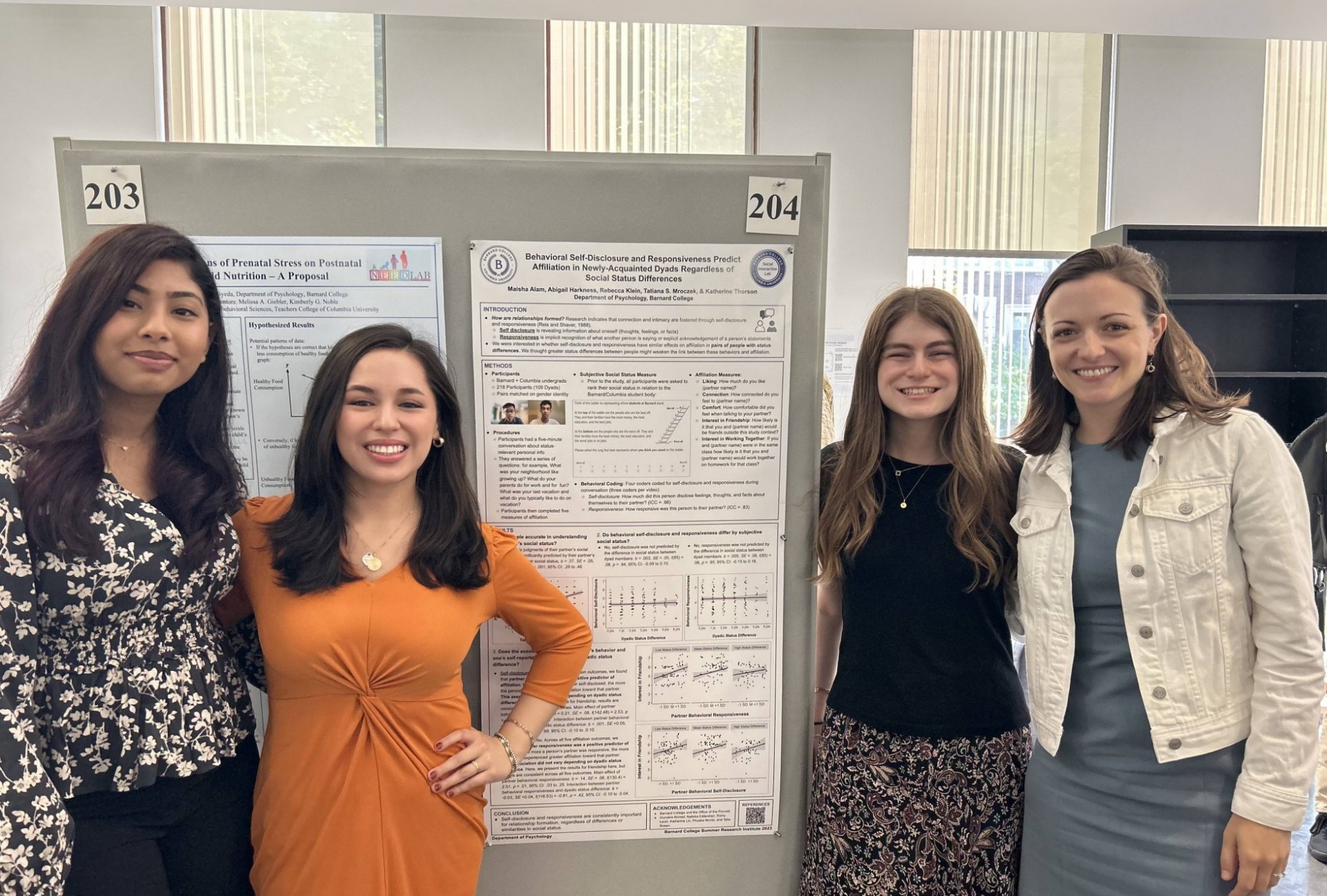
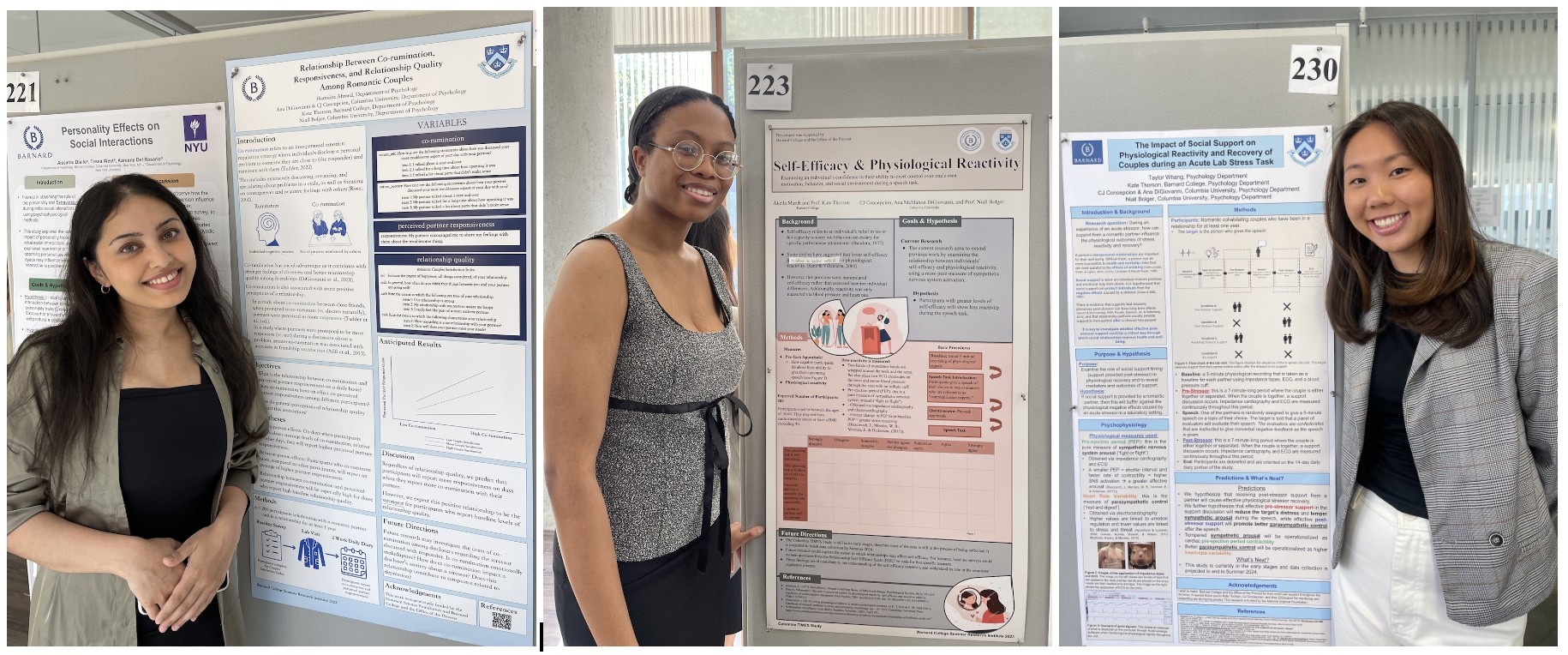
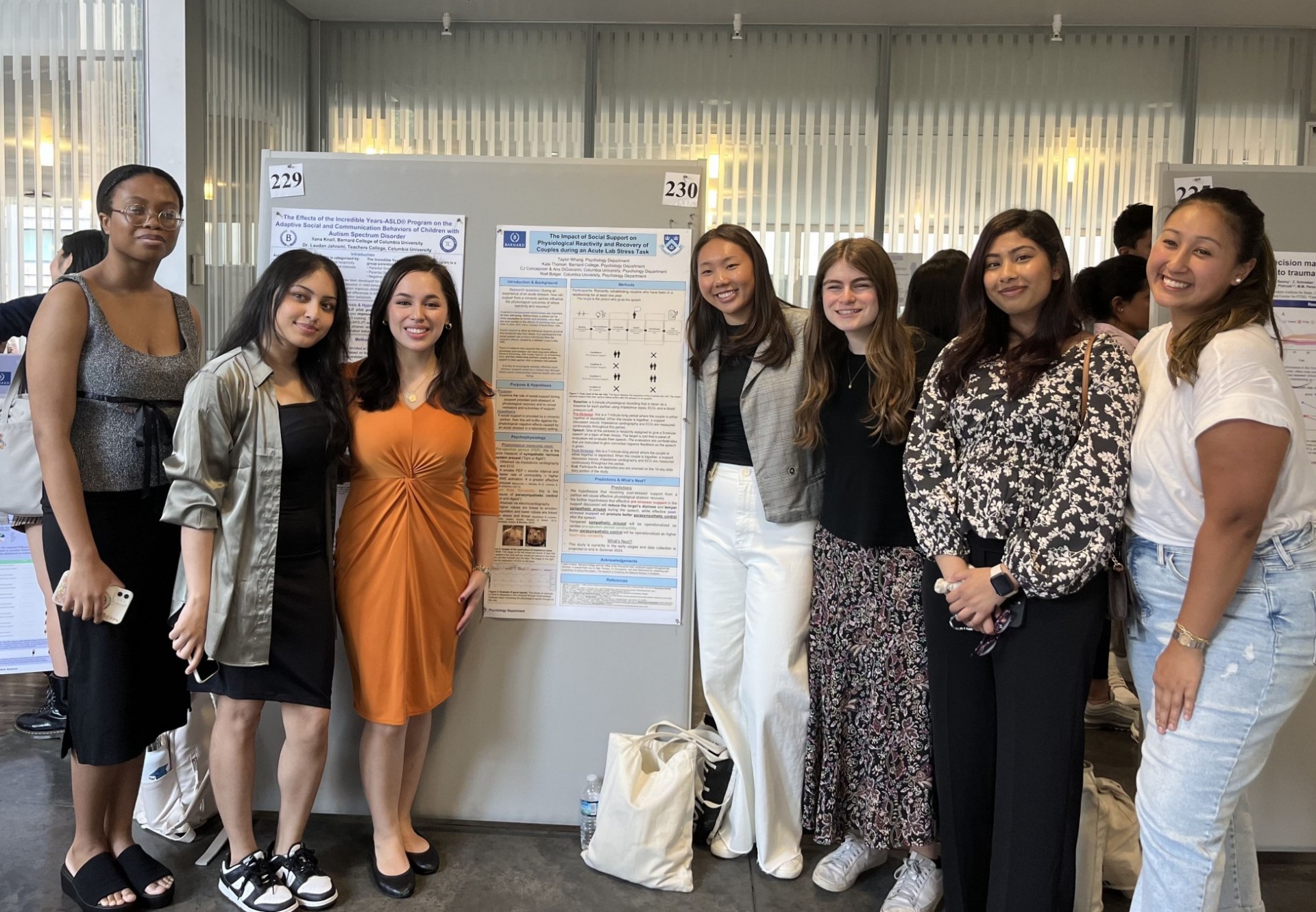
February 24 & 25, 2023: Society for Personality and Social Psychology Annual Conference
Humaira Ahmed and Katherine Lin presented posters on their summer projects at the Society for Personality and Social Psychology annual conference in Atlanta, Georgia. Katherine's poster was titled "The Importance of Getting Acquainted: Investigating How Initial Perceived Similarity Sets the Stage for Future Collaboration." Humaira's poster was titled "A Longitudinal Investigation of Student-Mentor Relationships: How are Students' Weekly Stress Appraisals Related to Weekly Perceptions of their Mentors’ Emotions?" The posters were incredible and included analysis of the complete data sets that were collected this past summer. Humaira and Katherine also got to attend multiple talks and poster sessions to broaden their knowledge about the fields of social and personality psychology. We are looking forward to doing further analysis on both of these studies and building off these results and studies in the future. Great job, Humaira and Katherine!
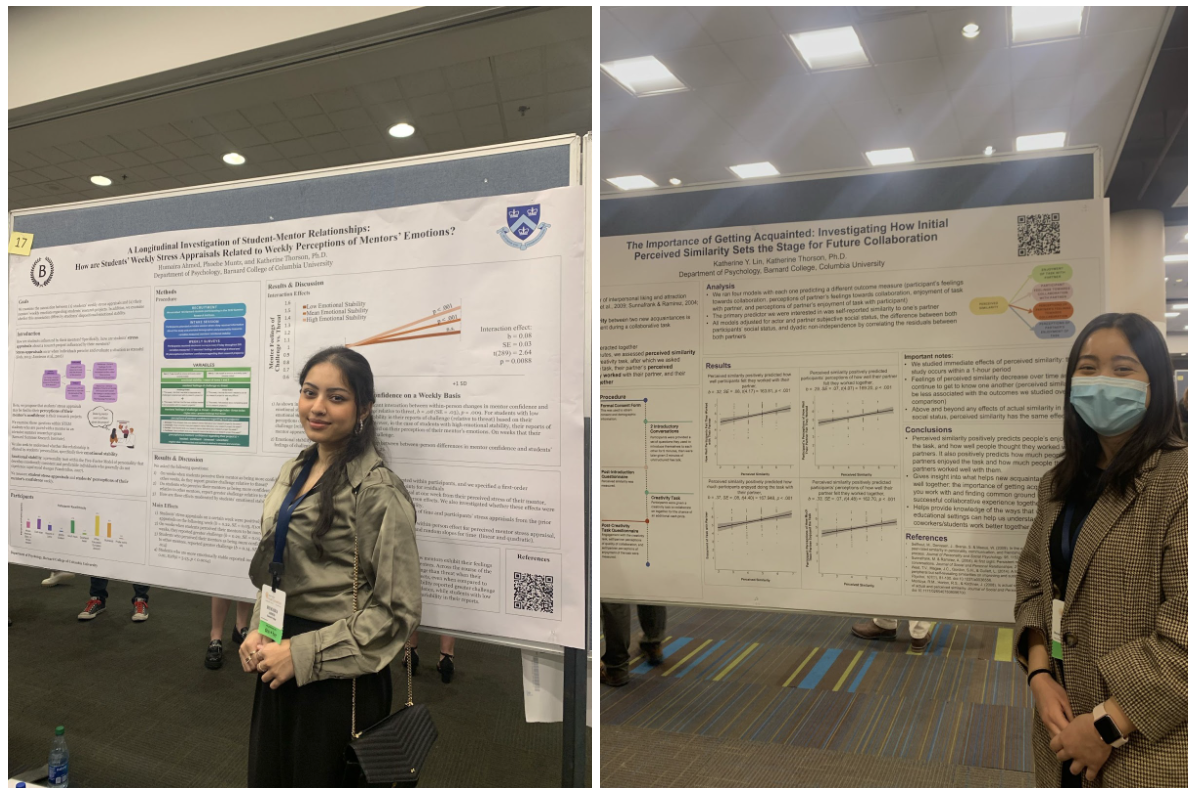
August 3, 2022: Summer Research Institute Poster Session
Humaira Ahmed, Katherine Lin, and Phoebe Muntz presented posters on their summer projects at the Lida Orzeck '68 Summer Research Institute Poster Session. Katherine's poster was titled "The Importance of Getting Acquainted: An Investigation of How Initial Perceived Similarity Sets the Stage for Future Collaboration." Humaira and Phoebe's poster was titled "A Longitudinal Investigation of Student-Mentor Relationships: How are Students' Weekly Stress Appraisals Related to Weekly Perceptions of their Mentor's Emotions?" The posters were fantastic and the results of lots of hard work this summer! We're looking forward to analyzing even more data from both of these projects in the future. Great work, everyone!
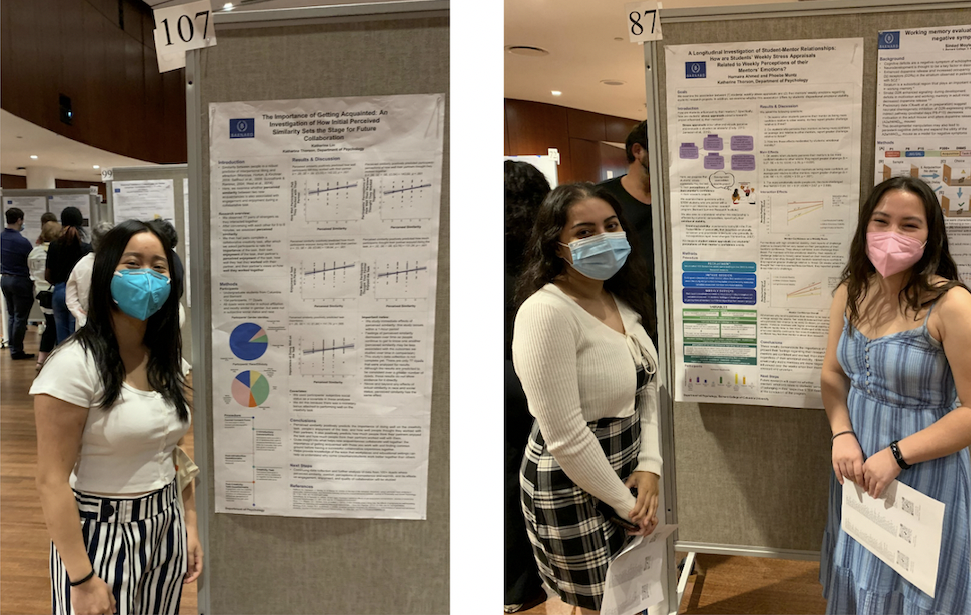
July 19, 2022: New Paper in Contemporary Educational Psychology
Peer tutoring programs are increasingly popular on college campuses, and some have speculated that they might help reduce gender gaps in STEM (science, technology, engineering, and math) fields. In a new paper, recently published in Contemporary Educational Psychology, we find that men and women (both tutors and students) show similar levels of behavioral engagement in STEM tutoring interactions—they ask and answer the same number of questions, talk for the same length of time, and appear equally engaged to outside coders. However, women report feeling more anxious and less confident than men feel after the sessions; they also appear less confident to outside coders. In addition, women tutors evaluate their own performance as tutors more poorly than men tutors do. This research reveals an important difference in women's and men's experiences during STEM peer tutoring interactions and suggests that interventions targeting women's emotional experiences during these sessions might be worthwhile for reducing gender gaps in STEM participation. Thank you to the tutors and students who participated in this work and the many research assistants who worked on this project. And big congratulations to PhD Student Affiliate Oana Dumitru for publishing her first first-author paper!
April 28, 2022: Psychology Research Festival
Emily Mintz presented her thesis research at the Psychology Research Festival this week. Emily’s thesis examined factors that make someone more or less likely to help another person suffering a mental health crisis. Congratulations to Emily on her dedication to this important project.
April 27, 2022: Honors Assembly Awards
Congratulations to three of our graduating lab members for receiving awards at this year’s Honors Assembly! Emily Mintz received The Millennial Psychology Prize, Talia Rosen received The Faculty Recognition Prize for Distinguished Achievement in Psychology, and Bri Vigorito received The Faculty Recognition Prize for Continued Dedication to Psychology.
Feb 18, 2022: Poster Presentation at SPSP
Talia Rosen presented a poster at the annual meeting of the Society for Personality and Social Psychology. She presented research she has been working with Bri Vigorito and Zoe Zeltner over the past year. In her poster, Talia describes how the social status of two strangers who are interacting with each predict how comfortable the strangers are with one another. Nice work, Talia!
Dec 10, 2021: Barnard Year of Science Presentation
As part of Barnard’s Year of Science, lab member Emily Mintz presented with the rest of the psychology senior thesis class in a session called “Methods and Realities in Psychological Research.” The senior thesis students described roadblocks they’ve encountered in their research and shared their solutions so far.
Read more about it here!
July 2021: New Paper in Social Science and Medicine
Do doctors and patients exhibit similarity in their physiological responses during interactions with one another? Our new paper, now published in Social Science and Medicine, suggests that they do. In this research, we measured the autonomic nervous system (ANS) responses of oncologists and patients during their consultations with each other to examine "physiological linkage." We found that patients showed physiological linkage to their doctors—meaning that doctors’ physiological responses positively predicted patients’ responses at a subsequent time interval—when their relationships spanned three to eight consultations. This work shows that, by "influencing" patients’ physiological responses on a moment-to-moment basis, doctors may have even more influence over patients’ physiology than previously known.
Dec 21, 2021: Phi Beta Kappa Inductions
Congratulations to lab members, Emily Mintz and Talia Rosen, on their Phi Beta Kappa inductions!
August 2021: Summer Research in the Lab
This summer, we had three student researchers in our lab who all did amazing work! Bri Vigorito joined the lab this summer through the Barnard Summer Research Institute, and Talia Rosen and Zoe Zeltner conducted independent studies. Take a look at two videos that Bri made, one about a day in her life as a student researcher and the other about presenting her research. Bri also wrote a post for the admissions office, about what it's like to do research in the lab.
June 2021: New Paper in Psychoneuroendocrinology
Does revealing more about oneself during a conversation with a new acquaintance predict greater similarity in cortisol changes with that person? Our new research in Psychoneuroendocrinology suggests that it does. In this research, pairs of new acquaintances asked each other personal questions. We measured self-disclosure—how much people revealed personal information to one another—while they were talking, and we also measured people's cortisol responses before and after the conversations. We found that self-disclosure was associated with more similarity in cortisol reactivity from before to after the conversation between dyad members. This research demonstrates one social process associated with cortisol similarity between people during early relationship formation and, in doing so, reveals a new process through which our physiological functioning may become tied to those around us—even those we have just met.
